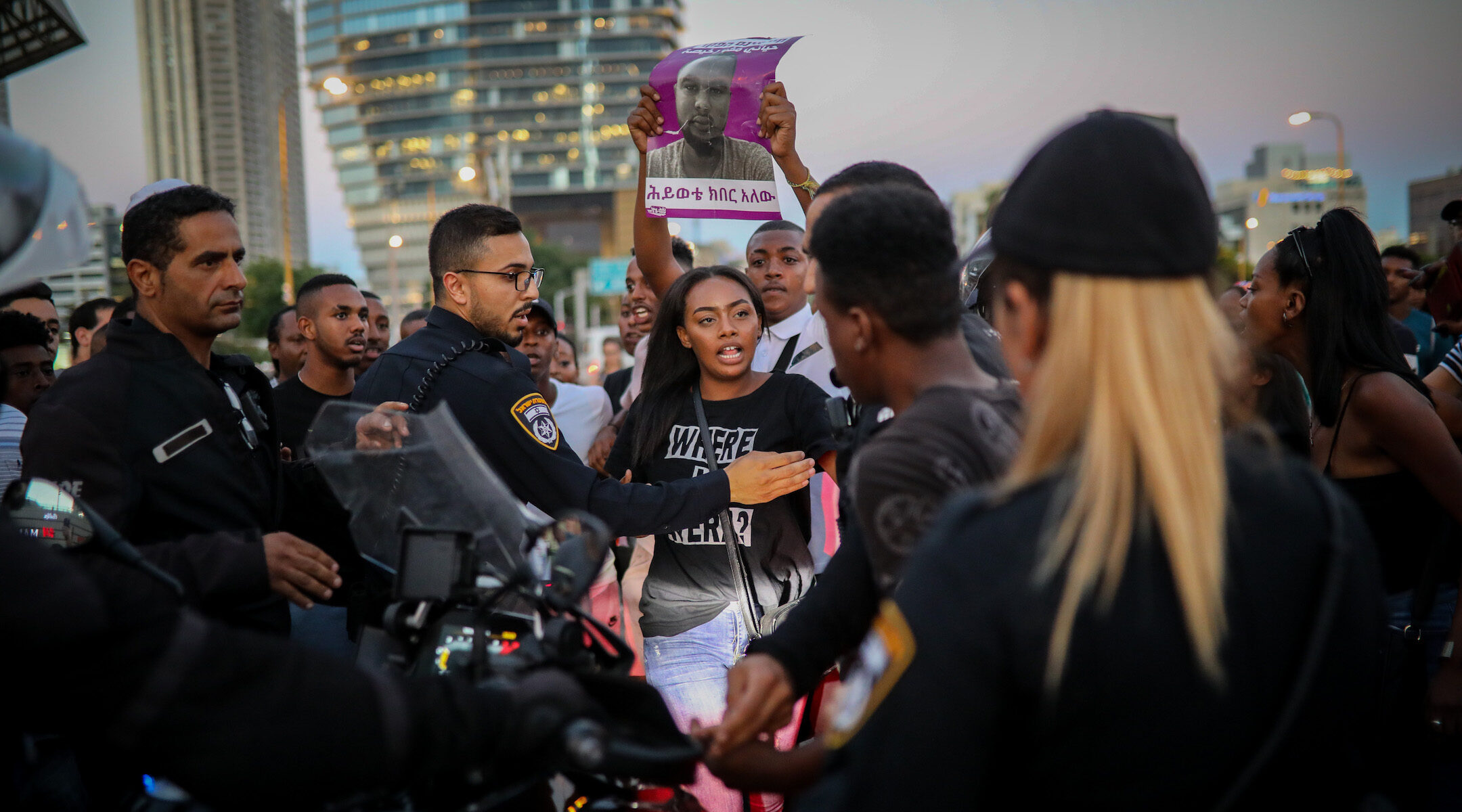The saga of Ethiopian Jewry has always involved heroism and tragedy — and so it is today.
Some of us remember the dramatic rescue efforts in the last four decades by the State of Israel to bring this ancient group of Beta Israel “home,” which instilled pride in Jews around the world. Yet there has been the heartbreak not only of those who perished along the way on the perilous journey by foot through deserts and hostile lands, but the suffering among the subsequent generations of Ethiopian Jews in Israel. Many of them lack decent wages, housing and educational opportunities.
For all the stirring stories of a color-blind society that responded to the rescues with compassion, the lingering reality today is one of discrimination, both formal and informal, in Israeli society. The seething tensions came to light in recent days when angry and sometimes violent demonstrations took place in Netanya after an 18-year-old unarmed young man of the Ethiopian community was fatally shot by a police officer on June 30.
Many in the community of about 150,000 Ethiopian Jews have long complained that the police pick on their youth, some of whom, adrift and living in poor conditions, turn to drink and drugs. Four years ago, after a video of policemen beating an Ethiopian youth came to light, the government created a commission to deal with racism. It found widespread evidence, from education to the IDF, but the problem remains. (In the current case, a police probe found that the officer fired at the ground and the bullet ricocheted into the teen’s body.)
A revealing essay last week by the former top executive of the Jewish Federations of North America reflected on the wide gap between attitudes toward Ethiopian Jewry in the heady days of Operation Moses in 1984, and Operation Solomon in 1991, the secret airlifts that together brought 22,000 Ethiopian Jews to Israel in dramatic fashion, and the lack of interest in the community today. Howard Rieger, who was president and CEO of JFNA from 2004 to 2009, wrote on eJewish Philanthropy of the Israeli government’s “grudging acceptance” in bringing in additional Ethiopian Jews after the airlifts, in contrast to Soviet Jews “who were brought in quickly.” He described his unsuccessful effort to launch Operation Promise, a major fundraising campaign in 2005 to foster more immigration absorption in Israel, primarily for Ethiopian Jews. It was aimed at improving educational opportunities, and support and counseling services for youth making the leap to life in a modern society. Rieger writes that two major federations resisted Operation Promise, with one saying that “Ethiopians don’t resonate with our leadership.” In the end the project was discontinued. But the problems that made it necessary continue to fester.
Today, federations have remained largely inactive on the Ethiopian Jewry front. One reason is that many of those of Beta Israel who remain in Ethiopia are seen as converts who are not sincerely practicing Jews but rather seeking better lives in Israel. Another reason given by federations is that they cannot fund additional aliyah without the government of Israel accepting more Ethiopians into the country. Activists on behalf of Ethiopian Jewry note, though, that the issue of aliyah should not preclude federations and other American Jewish organizations from providing humanitarian assistance to help communities still in Ethiopia survive.
The community is not asking for special treatment. It is just asking to be treated like every other Jewish community in the world…
“The community is not asking for special treatment. It is just asking to be treated like every other Jewish community in the world,” notes Joseph Feit, a past president of the North American Conference on Ethiopian Jewry and an advocate for rescue and other efforts on behalf of the community since 1988.
A group Feit is affiliated with, Struggle to Save Ethiopian Jewry (SSEJ), with support from NACOEJ, provides funds to the Beta Israel community in Ethiopia.
Joey Low, a longtime activist for Ethiopian Jewry who made aliyah from New York this past year, believes the Israeli government has a serious racism problem in its treatment of illegal African immigrants as well as Ethiopian Jews. “I’ve been told directly by immigration officials that the government wants them [those from African countries] to leave,” Low said, “and the officials’ job is to make life hard for them. It’s very sad.”
He focuses his philanthropy on providing university scholarships for young Ethiopian Jews. “They don’t feel accepted in this society, and they have a real identity crisis. Hopefully there will be young leaders to emerge from the community” to help address the crisis.
In the meantime, ironically, the long-ago rescue of Ethiopian Jews and the enthusiasm for their absorption will be revived on a major scale this week with the release on Netflix of “The Red Sea Diving Resort.” Produced by award-winner Gideon Raff (“Prisoners Of War”), the drama is based on a beachfront resort on the Red Sea that was used as a front for the Mossad to smuggle thousands of Ethiopian Jews to Israel.
Perhaps the film, whose story personifies the Zionist ideal, will call attention to the current plight that, sadly, plays out every day.
The New York Jewish Week brings you the stories behind the headlines, keeping you connected to Jewish life in New York. Help sustain the reporting you trust by donating today.





